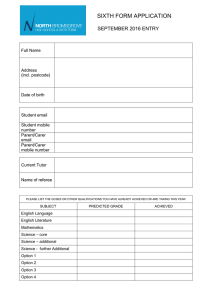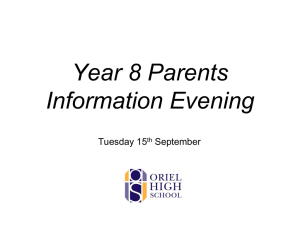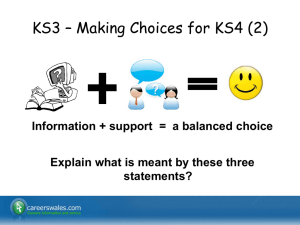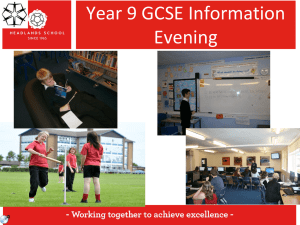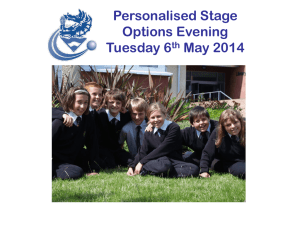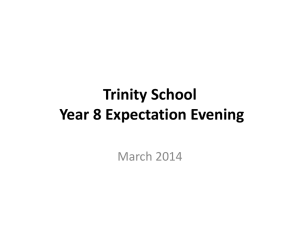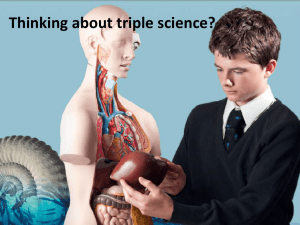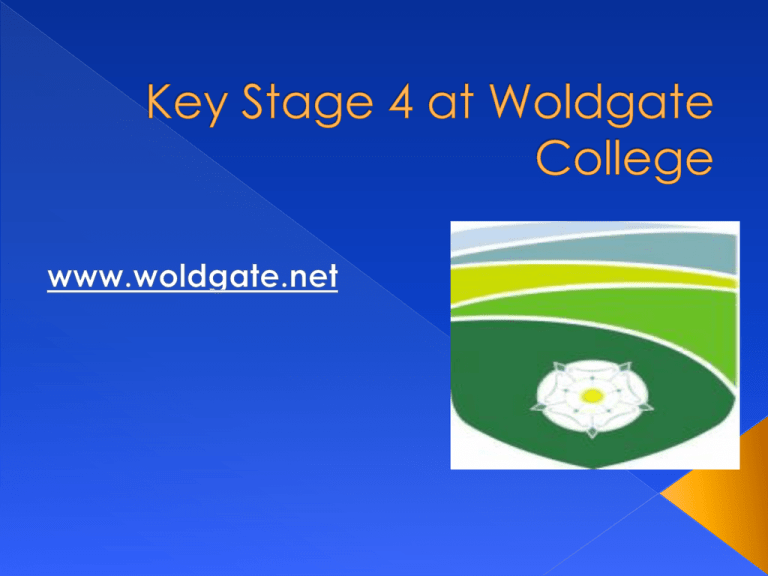
Changes to Key Stage 4 – ‘Increased
rigour’
All GCSE exams are now be ‘terminal’ i.e. tested at the end of the
course.
That means that there will be no module exams during Years 10 &
11, no retakes or autumn 2014 retakes for anything other than
Maths & English and no possibility of entering controlled conditions
coursework twice to improve marks.
Non-GCSE courses can only make up 20% of a students’ learning.
‘SPAG’ marks have increased on all subjects’ exam papers –
spelling, punctuation & grammar.
There has been a shift towards extended writing (longer answers!)
on most subjects’ exam papers. Speaking & Listening marks have
been taken out of English GCSE.
The School Performance Tables will, for the students taking GCSEs
in 2016 (that’s 9MSM!), dictate the range of subjects you are able
to choose from. This is to ensure that all students in England follow
a ‘broadly academic curriculum’.
Decisions need to be taken:
Carefully.
With all the information available
to you.
With a long term plan in mind.
With the advice of people who
know and care about you.
By the person who is going to be
most effected by them.
September 2014
September 2016
September 2018
September 2024
Core Subjects:
English, Literature, Maths, Single Science – all leading to GCSEs.
RE – leading to GCSE RE at the end of Year 11.
PE - for enjoyment & health.
Health, Sex & Relationships Education – to prepare for adulthood.
Citizenship – to develop you as a rounded and skilled person, ready to
take on the rights and responsibilities of being a Citizen .
EBac List – at least 2 from:
Additional Science, Triple
Science, History, Geography,
French, Spanish, Computer
Science.
There is time for
you to take 4
Extension courses
in total.
Wider Subjects List – up to 2
subjects from:
Art & Design, Business
Communications, D&T Food,
D&T Textiles, D&T Product
Design, Drama, Health &
Social Care, Media Studies,
Music, Physical Education,
ICT (Nat Cert)
Timeline:
February 6th:
Information evening for pupils and their families. Documents
distributed in Citizenship.
March 6th:
Year 9 Reports Issued.
Feb/March:
Year 9 Assemblies & Citizenship time to focus on information
gathering & decision-making. Subject information available
in lessons & Assemblies.
March 13th:
Year 9 Student, Parent and Tutor meetings.
March 17th :
Deadline for application forms to be with your Tutor. Please be
aware that there may be little, if any, opportunity to change
your mind after this point!
Easter – Half Term: Individual Interviews with Ms Holland, Mr Greenfield, Mr
Smith or Mrs Burch.
June:
Application process over, decisions made, timetables sorted!
July:
Analysis of KS3 Teacher Assessments – further interviews if
needed.
September:
Key Stage 4 starts in all subjects.
Take your time.
Be informed.
Think long term
Get a reference from your family.
Get a reference from your tutor.
Fill in your letter of application carefully –
show us you are thinking carefully about
your choices.
Aim high in all your subject areas –
remember that NC Levels are reported to
your parents, the DfE and on to your
school records at the end of Year 9



